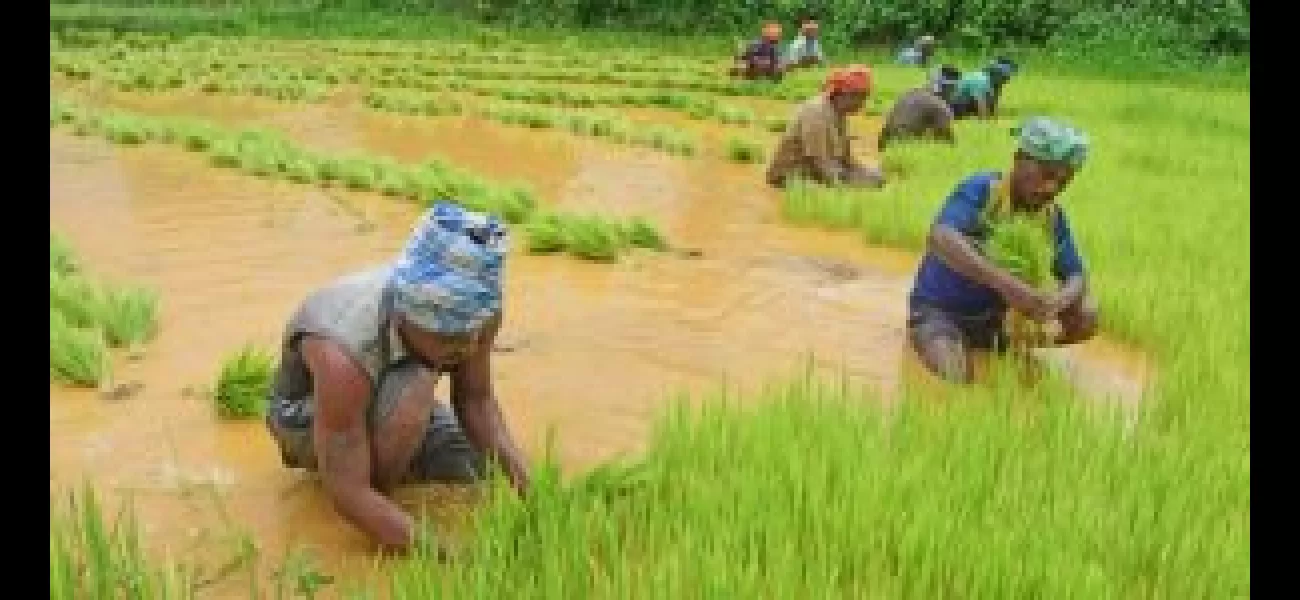Farmers abandoning paddy cultivation due to declining profits.
Farmers in Jajpur are shifting away from growing paddy due to decreasing profits, despite their hard work, according to a recent report.
June 14th 2024.

A recent report has revealed that farmers in Jajpur are increasingly turning away from cultivating paddy due to a decline in profits. Despite their hard work throughout the year, the earnings from paddy have been disappointing for the past five years. This trend is causing concerns about a potential increase in food prices in the future. Experts believe that this decline in profits is a result of administrative negligence towards the agricultural sector.
Some farmers, wishing to remain anonymous, have shared their frustration about the current situation. They claim that if the government does not follow through on its promise to buy paddy at a rate of Rs 3,100 per quintal, they will struggle to make a decent profit. This decline in profits has forced many poor and marginal farmers to migrate to other states in search of alternative livelihoods. The rapid industrialization and changing climate have also had a significant impact on rural life and agriculture. Farmers have to constantly battle droughts and floods, making it difficult to protect their crops.
One of the major challenges faced by farmers is the lack of irrigation facilities for cultivation. This, along with irregularities and negligence in paddy procurement, has had a severe impact on their profits. According to reports from the Agriculture and Farmers' Empowerment Department, farmers spent an average of Rs 1,455 per quintal on paddy cultivation in 2023-24, but were only able to sell it at Rs 2,183 per quintal.
To address these issues, the district administration has urged the regulated market committees to ensure a smooth paddy procurement process for the farmers. The timely procurement of paddy and hassle-free payment to farmers are crucial factors, but unfortunately, these aspects are often overlooked. The elected representatives also seem to forget about the struggles faced by farmers.
As a result, farmers continue to suffer due to alleged negligence and collusion between officials and middlemen. These loopholes in the procurement process have resulted in delayed opening of mandis, manipulation of registrations and tokens, and ultimately, losses for the farmers. In the past, farmers had to rely on millers for paddy procurement, but the state government has now started purchasing paddy through government-authorised PACs. However, some officials and middlemen are still taking advantage of the system, causing further losses for the farmers.
It is high time for the authorities to address these issues and ensure that farmers are not exploited. The paddy procurement process should be fair and timely, allowing farmers to become self-reliant and earn a decent profit from their hard work. Only then can we prevent the decline in paddy cultivation and secure the future of our farmers.
Some farmers, wishing to remain anonymous, have shared their frustration about the current situation. They claim that if the government does not follow through on its promise to buy paddy at a rate of Rs 3,100 per quintal, they will struggle to make a decent profit. This decline in profits has forced many poor and marginal farmers to migrate to other states in search of alternative livelihoods. The rapid industrialization and changing climate have also had a significant impact on rural life and agriculture. Farmers have to constantly battle droughts and floods, making it difficult to protect their crops.
One of the major challenges faced by farmers is the lack of irrigation facilities for cultivation. This, along with irregularities and negligence in paddy procurement, has had a severe impact on their profits. According to reports from the Agriculture and Farmers' Empowerment Department, farmers spent an average of Rs 1,455 per quintal on paddy cultivation in 2023-24, but were only able to sell it at Rs 2,183 per quintal.
To address these issues, the district administration has urged the regulated market committees to ensure a smooth paddy procurement process for the farmers. The timely procurement of paddy and hassle-free payment to farmers are crucial factors, but unfortunately, these aspects are often overlooked. The elected representatives also seem to forget about the struggles faced by farmers.
As a result, farmers continue to suffer due to alleged negligence and collusion between officials and middlemen. These loopholes in the procurement process have resulted in delayed opening of mandis, manipulation of registrations and tokens, and ultimately, losses for the farmers. In the past, farmers had to rely on millers for paddy procurement, but the state government has now started purchasing paddy through government-authorised PACs. However, some officials and middlemen are still taking advantage of the system, causing further losses for the farmers.
It is high time for the authorities to address these issues and ensure that farmers are not exploited. The paddy procurement process should be fair and timely, allowing farmers to become self-reliant and earn a decent profit from their hard work. Only then can we prevent the decline in paddy cultivation and secure the future of our farmers.
[This article has been trending online recently and has been generated with AI. Your feed is customized.]
[Generative AI is experimental.]
0
0
Submit Comment





